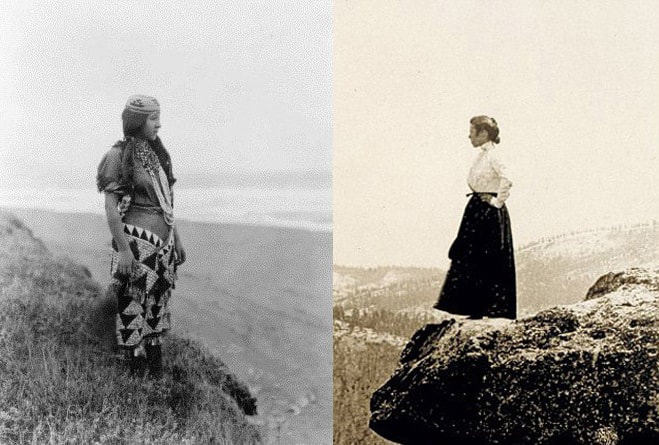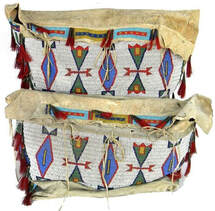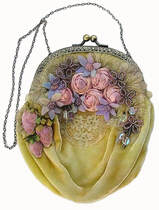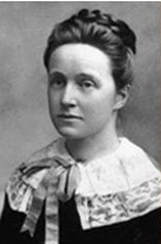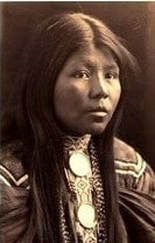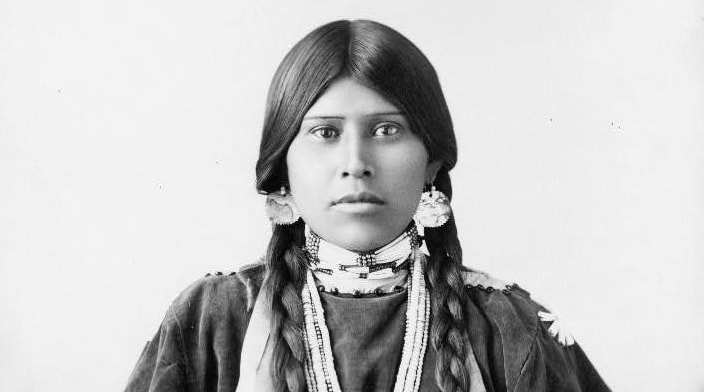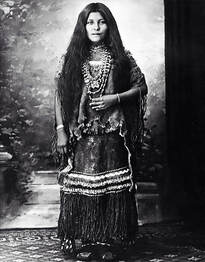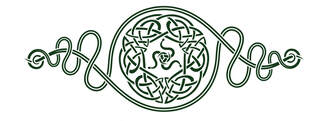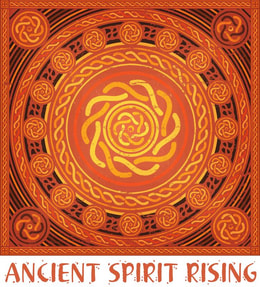White Feminists in Solidarity with Indigenous Women
PEGI EYERS
PEGI EYERS
DEAR WHITE WOMEN ~
As members of the dominant European society who created racial, gender and class inequality in the Americas in the first place, many of us have reached the conclusion that to take responsibility for our unearned social power means demanding full human rights for ALL women. As we take on social justice work to right the wrongs of history, and act in solidarity with Indigenous women who have been oppressed by Empire, we enter a liminal zone. The interface between oppressor and oppressed is a shifting ground of assumptions, protocol and intercultural sharing - a borderland of hearts and minds offering anger, rebuke, confusion, kindness and sorrow. And at the same time that we are reclaiming earth-based paths that value reciprocity with all life, we must ensure that our work as allies does not replicate colonialism, or impact Indigenous women in the Americas with more negativity, such as white perspectivism, knowledge domination or cultural theft.
Once lost in the hegemonic agenda of Empire, we are finally waking up in unprecedented numbers from the patriarchal mass delusion that oppresses women, the Earth and tribal peoples that live in connection to Her. It has taken us centuries to finally rebel against the horrors and inequalities of white male supremacy (!) and our liberation is well underway. White feminists, libfems and radfems are working hard within a vast coalition, to shift our society to the egalitarian values that embody cooperation and inclusion, instead of hierarchy and control. There is evidence everywhere of a collective movement toward a paradigm offering personal and planetary healing, community cohesiveness, earth-connected sustainability, biophilia and peaceful co-existence. We are also being asked at this monumental time to choose between collaborating with, or resisting racial injustice.
For white women, our unchecked privilege and unexamined racism may sabotage our potential to work toward common causes, and perpetuates divisions. Of major concern is how feminist ideology has failed to acknowledge the historic difference between white identity and Indigenous women, and the incorrect assumption that native and non-native women are working through the same liberation process. Yet our oppressions are not interchangeable, as white women seek to reject or overthrow the patriarchy, while Indigenous women are working toward the recovery of their own traditional culture, sovereignty and self-determination. It does not seem to occur to white feminists that the struggle in the dominant society for women’s rights has no equivalent in Indigenous resistance efforts that seek decolonization. “There is a difference between fighting for ‘rights’ and fighting against ending occupation, imperialism, and femicide. When we seek ‘rights,’ we are asking to be integrated into a system that aims to destroy our entire existence.” [1]
As members of the dominant European society who created racial, gender and class inequality in the Americas in the first place, many of us have reached the conclusion that to take responsibility for our unearned social power means demanding full human rights for ALL women. As we take on social justice work to right the wrongs of history, and act in solidarity with Indigenous women who have been oppressed by Empire, we enter a liminal zone. The interface between oppressor and oppressed is a shifting ground of assumptions, protocol and intercultural sharing - a borderland of hearts and minds offering anger, rebuke, confusion, kindness and sorrow. And at the same time that we are reclaiming earth-based paths that value reciprocity with all life, we must ensure that our work as allies does not replicate colonialism, or impact Indigenous women in the Americas with more negativity, such as white perspectivism, knowledge domination or cultural theft.
Once lost in the hegemonic agenda of Empire, we are finally waking up in unprecedented numbers from the patriarchal mass delusion that oppresses women, the Earth and tribal peoples that live in connection to Her. It has taken us centuries to finally rebel against the horrors and inequalities of white male supremacy (!) and our liberation is well underway. White feminists, libfems and radfems are working hard within a vast coalition, to shift our society to the egalitarian values that embody cooperation and inclusion, instead of hierarchy and control. There is evidence everywhere of a collective movement toward a paradigm offering personal and planetary healing, community cohesiveness, earth-connected sustainability, biophilia and peaceful co-existence. We are also being asked at this monumental time to choose between collaborating with, or resisting racial injustice.
For white women, our unchecked privilege and unexamined racism may sabotage our potential to work toward common causes, and perpetuates divisions. Of major concern is how feminist ideology has failed to acknowledge the historic difference between white identity and Indigenous women, and the incorrect assumption that native and non-native women are working through the same liberation process. Yet our oppressions are not interchangeable, as white women seek to reject or overthrow the patriarchy, while Indigenous women are working toward the recovery of their own traditional culture, sovereignty and self-determination. It does not seem to occur to white feminists that the struggle in the dominant society for women’s rights has no equivalent in Indigenous resistance efforts that seek decolonization. “There is a difference between fighting for ‘rights’ and fighting against ending occupation, imperialism, and femicide. When we seek ‘rights,’ we are asking to be integrated into a system that aims to destroy our entire existence.” [1]
Our trajectories are not the same, but it is true that ALL women have been oppressed by the hetero-patriarchy since European landfall in the Americas. Our experiences could not be more different, and yet for countless years all of our voices were denied, suppressed, criminalized, and unwelcome at the table. Indigenous women have been excluded, spoken over and ignored, and during the entire Christian era in Europe (and later in the colonies) white women were expected to be silent, obedient and invisible. The legend is passed down that when learning of the status of white women at the time of European contact, First Nations often wondered - what kind of demented people would marginalize, enslave, denounce and abuse their own women?
To make things even more complicated, patriarchal oppression did not exist in Indigenous societies, and is a colonial overlay, the racist agenda being to devalue both genders and set up false hierarchies where none existed before. Traditional Indigenous societies were egalitarian and based on the model of the consensus circle, with the emphasis being on gender harmony rather than gender equality. “The Indigenous Circle of Life philosophy more appropriately embodies Aboriginal women’s conceptions of human nature, their political philosophy and their strategy for social change and liberation.” [2]
In our own era, there are other major differences in perception. Not surprisingly, many Indigenous women deny the white-directed universal notion of a "Global Sisterhood" (newsflash!) and reject the principles of modern feminism by situating it as a movement directed entirely by white privilege. Indigenous women may also object to the widely-circulated idea that we share identity or experience simply by virtue of being women, and by possessing the same nurturing and reproductive female anatomy. For white women, we continue to cause offense by ignoring the legacy of colonialism (which is our own history), and discounting First Nations counter-narratives as equal to our own. Many white feminists also have a delusional tendency to insist on a "post-racial automatic harmony" in the face of ongoing systemic racism and institutionalized white supremacy. In fact, there is NO level playing field in our shared spaces, and to expect otherwise is to dismiss Indigenous identity and impose yet another form of assimilation.
“There is a reductionism inherent in liberalist conceptions of unity, and from the Aboriginal perspective, the best laid plans for native/non-native partnership may always have the feel of homogenization.”[3] We need to be aware that in all sectors of culture and society - including movements and subcultures such as Feminism, Paganism, Wicca, Goddess Spirituality, Cultural Reconstruction, Rewilding, Permaculture, Transformational and New Age - neo-liberalism claims a universalist, humanist approach while having an effect on WOC that is the exact opposite.
To make things even more complicated, patriarchal oppression did not exist in Indigenous societies, and is a colonial overlay, the racist agenda being to devalue both genders and set up false hierarchies where none existed before. Traditional Indigenous societies were egalitarian and based on the model of the consensus circle, with the emphasis being on gender harmony rather than gender equality. “The Indigenous Circle of Life philosophy more appropriately embodies Aboriginal women’s conceptions of human nature, their political philosophy and their strategy for social change and liberation.” [2]
In our own era, there are other major differences in perception. Not surprisingly, many Indigenous women deny the white-directed universal notion of a "Global Sisterhood" (newsflash!) and reject the principles of modern feminism by situating it as a movement directed entirely by white privilege. Indigenous women may also object to the widely-circulated idea that we share identity or experience simply by virtue of being women, and by possessing the same nurturing and reproductive female anatomy. For white women, we continue to cause offense by ignoring the legacy of colonialism (which is our own history), and discounting First Nations counter-narratives as equal to our own. Many white feminists also have a delusional tendency to insist on a "post-racial automatic harmony" in the face of ongoing systemic racism and institutionalized white supremacy. In fact, there is NO level playing field in our shared spaces, and to expect otherwise is to dismiss Indigenous identity and impose yet another form of assimilation.
“There is a reductionism inherent in liberalist conceptions of unity, and from the Aboriginal perspective, the best laid plans for native/non-native partnership may always have the feel of homogenization.”[3] We need to be aware that in all sectors of culture and society - including movements and subcultures such as Feminism, Paganism, Wicca, Goddess Spirituality, Cultural Reconstruction, Rewilding, Permaculture, Transformational and New Age - neo-liberalism claims a universalist, humanist approach while having an effect on WOC that is the exact opposite.
Unpacking our colonial history as white women ("Herstory") allows us to identify our blind spots and omissions. In the 1450–1700 genocide of the Burning Times (otherwise known as the “Women’s Holocaust”), we lost our European wise women, keepers of the Old Ways, ,and “waeccan” healers. Forced to comply with the total supremacy of a “man’s world,” we were the passive and suffering victims of Empire, or the supporting cast and game players who internalized the patriarchal values and were complicit with the colonial directive. Until the flowering of first-wave feminism, we were dominated by the patriarchy for millennia. And as much as we have achieved emancipation and empowerment today, we need to realize that the privileges we experience as white women are the result of white supremacy. As the T-shirts say, "I Am a Genocide Beneficiary" and “I Benefit from Colonialism." The gifts and amenities we take for granted in our daily lives have come at the high cost of human suffering, and the near-annihilation of both Indigenous peoples and the land.
“There needs to be struggle in order to lay out a path to co-existence, and that the process of being uncomfortable is essential for non-indigenous people to move from being enemy to adversary to Ally.” [4]
The truth about Settler-Colonialism is hard to take, especially when we learn that our own values were stolen, and how many of our people lost their lives as a result of the structural violence endemic to Empire. As we were forced to assimilate into the monocultural white mainstream of the Americas, we left behind our traditional European languages, foods, music, games, rituals and spiritual expressions. During the collective dementia of expulsion and immigration, we sacrificed our European histories and spirituality, our love of place, our deep connections to the Ancestors, and our most important cultural keystones. In exile, our survival mechanism kicked in, our traditions were traded away, and our cultural loss forgotten in the promise of a new land and a new life.
“The Settler Society were all displaced - they all left something behind, and that must be why they are attracted to Native Spirituality.” [5]
Today, as the modern descendants of the Settler Society, we need to examine how this immense cultural soul loss has led to our collective and personal dysfunction, and how the stories of our disconnect are at the root of our ongoing spiritual hunger and yearning for holistic earth-connected community. Clearly this exile from our own ancestral knowledge is the contributing factor to our romanticism and appropriation from the vibrancy of Indigenous cultures. There are other serious issues and oversights to be found in today's white feminism community, including:
1) The invisibility of Indigenous women,
2) not knowing the history of Settler-Colonialism or the First Nations in our own area,
3) ignoring how colonization, cultural genocide and assimilation are not just historical "artifacts" but are still happening today. "It's all in the past" is an offensive statement resulting from white oblivion and entitlement,
4) treating the sacred cultural markers of First Nations as a marketplace to "exotify" our own ideas and offerings,
5) coasting along and being complacent with colonialism,
6) not doing our own work in self-education, and expecting Indigenous women to do the "heavy lifting,"
6) not acknowledging our white and class privilege up front in every situation,
7) being a “Becky” or a "Karen" - a type of white woman who “exists in a state of racial obliviousness that shifts from intentionally clueless to intentionally condescending," [6]
8) spiritual bypassing i.e. "I'm too evolved for these dialogues," "We Are All One" and rejecting social justice or allyship,
9) gaslighting and "blaming the victim" with New Age beliefs such as "everyone creates their own reality,"
10) making assumptions, upholding stereotypes and imposing our own values and beliefs (known as "white perspectivism"),
11) obvious forms of white supremacy, subtle acts of racism such as microaggressions, and
12) not knowing how to work as allies for the legal struggles and battles of Indigenous women against the Settler State.
“There needs to be struggle in order to lay out a path to co-existence, and that the process of being uncomfortable is essential for non-indigenous people to move from being enemy to adversary to Ally.” [4]
The truth about Settler-Colonialism is hard to take, especially when we learn that our own values were stolen, and how many of our people lost their lives as a result of the structural violence endemic to Empire. As we were forced to assimilate into the monocultural white mainstream of the Americas, we left behind our traditional European languages, foods, music, games, rituals and spiritual expressions. During the collective dementia of expulsion and immigration, we sacrificed our European histories and spirituality, our love of place, our deep connections to the Ancestors, and our most important cultural keystones. In exile, our survival mechanism kicked in, our traditions were traded away, and our cultural loss forgotten in the promise of a new land and a new life.
“The Settler Society were all displaced - they all left something behind, and that must be why they are attracted to Native Spirituality.” [5]
Today, as the modern descendants of the Settler Society, we need to examine how this immense cultural soul loss has led to our collective and personal dysfunction, and how the stories of our disconnect are at the root of our ongoing spiritual hunger and yearning for holistic earth-connected community. Clearly this exile from our own ancestral knowledge is the contributing factor to our romanticism and appropriation from the vibrancy of Indigenous cultures. There are other serious issues and oversights to be found in today's white feminism community, including:
1) The invisibility of Indigenous women,
2) not knowing the history of Settler-Colonialism or the First Nations in our own area,
3) ignoring how colonization, cultural genocide and assimilation are not just historical "artifacts" but are still happening today. "It's all in the past" is an offensive statement resulting from white oblivion and entitlement,
4) treating the sacred cultural markers of First Nations as a marketplace to "exotify" our own ideas and offerings,
5) coasting along and being complacent with colonialism,
6) not doing our own work in self-education, and expecting Indigenous women to do the "heavy lifting,"
6) not acknowledging our white and class privilege up front in every situation,
7) being a “Becky” or a "Karen" - a type of white woman who “exists in a state of racial obliviousness that shifts from intentionally clueless to intentionally condescending," [6]
8) spiritual bypassing i.e. "I'm too evolved for these dialogues," "We Are All One" and rejecting social justice or allyship,
9) gaslighting and "blaming the victim" with New Age beliefs such as "everyone creates their own reality,"
10) making assumptions, upholding stereotypes and imposing our own values and beliefs (known as "white perspectivism"),
11) obvious forms of white supremacy, subtle acts of racism such as microaggressions, and
12) not knowing how to work as allies for the legal struggles and battles of Indigenous women against the Settler State.
So what can we actually do, to act in solidarity with Indigenous women? Among other initiatives, the Allyship Framework is a great model that allows us to draw close and give back to First Nations, as accomplices in the struggle for racial justice. Here are some other excellent ideas:
1) Recognize that your own bias, lack of knowledge and misconceptions can be interpreted as discrimination or racism,
2) center the voices of Indigenous women - listen and learn - and use respectful communication at all times,
3) be aware that protocols exist, and demonstrate cultural respect by making it a priority to learn about them,
4) recognize that gender roles may vary among Indigenous families, and observe local practices and protocols,
5) understand how lateral violence and internalized oppression show up in Indigenous community, and
6) stand with Indigenous women who are doing important work, become a helper, raise funds for Indigenous causes, attend events, follow pages and blogs, and offer support as needed.
In today's white spaces of conferences, events, academia and the empowerment circuit, there is a hopeful movement toward "inclusivity." And yet, this may only be the first step. According to the Allyship Framework, what we really need to be doing is include Indigenous women in our dialogues and initiatives from the very beginning, and place them in the prominent position. Fortunately, the resurgence of women in governance and key leadership roles continues to rise in every cultural and ethnic group, including Turtle Island First Nations. And our job as white women is to develop good intercultural competency skills, normalize the activist-spiritual path as one and the same, and work toward dismantling racism and white supremacy.
As time goes on, transformational encounters between Indigenous and white women will continue to happen at the personal level, with the goal to communicate and heal social relationships. This aspect of reconciliation requires an expansion of intimate heart-knowing, and a capacity to acknowledge the residual pain of historic and contemporary injustice. “One can forgive but one should never forget.” It’s a monumental leap to go from colonization to mutual co-arising, but as ALL women now share Turtle Island, we have an obligation to respond to the Seven Generations code.[7] And through the ongoing work of uncolonization, bonds to the land and holistic teachings evoked from our own ancestral wisdom traditions hold the key to restoring the hearts and minds of individuals and communities.
A renaissance of healing, collaborating, rebuilding, and re-visioning is happening in Indian Country, and for Indigenous women the future looks positive for the continued resurgence and reclamation of self-determination and traditional Indigenous Knowledge (IK). In terms of commonalities, ancient matriarchal societies in Europe provide models for their descendants today, and many First Nations have never relinquished their matrifocal status. For example, in the Haudenosaunee world, as Earthkeepers and life-givers the Clan Mothers hold the highest authority, and are skilled at making decisions affecting the well-being of the entire tribe.
Today, finding our way home means relinquishing our white privilege and engaging with social justice, which is synonymous with spiritual values such as balance and interconnection. Restoring the traditional earth-emergent and matrilineal structures that existed before, can be part of reclaiming power for ALL women. In the meantime, the way forward is to work in solidarity with the First Nations of Turtle Island, who continue to resist the genocide, colonization and oppression forced upon them by the flawed mega-experiment of Eurocentric Empire in the Americas. And to align with true human beings everywhere, who seek to bond with the land and practice our authentic Ancestral Wisdom.
1) Recognize that your own bias, lack of knowledge and misconceptions can be interpreted as discrimination or racism,
2) center the voices of Indigenous women - listen and learn - and use respectful communication at all times,
3) be aware that protocols exist, and demonstrate cultural respect by making it a priority to learn about them,
4) recognize that gender roles may vary among Indigenous families, and observe local practices and protocols,
5) understand how lateral violence and internalized oppression show up in Indigenous community, and
6) stand with Indigenous women who are doing important work, become a helper, raise funds for Indigenous causes, attend events, follow pages and blogs, and offer support as needed.
In today's white spaces of conferences, events, academia and the empowerment circuit, there is a hopeful movement toward "inclusivity." And yet, this may only be the first step. According to the Allyship Framework, what we really need to be doing is include Indigenous women in our dialogues and initiatives from the very beginning, and place them in the prominent position. Fortunately, the resurgence of women in governance and key leadership roles continues to rise in every cultural and ethnic group, including Turtle Island First Nations. And our job as white women is to develop good intercultural competency skills, normalize the activist-spiritual path as one and the same, and work toward dismantling racism and white supremacy.
As time goes on, transformational encounters between Indigenous and white women will continue to happen at the personal level, with the goal to communicate and heal social relationships. This aspect of reconciliation requires an expansion of intimate heart-knowing, and a capacity to acknowledge the residual pain of historic and contemporary injustice. “One can forgive but one should never forget.” It’s a monumental leap to go from colonization to mutual co-arising, but as ALL women now share Turtle Island, we have an obligation to respond to the Seven Generations code.[7] And through the ongoing work of uncolonization, bonds to the land and holistic teachings evoked from our own ancestral wisdom traditions hold the key to restoring the hearts and minds of individuals and communities.
A renaissance of healing, collaborating, rebuilding, and re-visioning is happening in Indian Country, and for Indigenous women the future looks positive for the continued resurgence and reclamation of self-determination and traditional Indigenous Knowledge (IK). In terms of commonalities, ancient matriarchal societies in Europe provide models for their descendants today, and many First Nations have never relinquished their matrifocal status. For example, in the Haudenosaunee world, as Earthkeepers and life-givers the Clan Mothers hold the highest authority, and are skilled at making decisions affecting the well-being of the entire tribe.
Today, finding our way home means relinquishing our white privilege and engaging with social justice, which is synonymous with spiritual values such as balance and interconnection. Restoring the traditional earth-emergent and matrilineal structures that existed before, can be part of reclaiming power for ALL women. In the meantime, the way forward is to work in solidarity with the First Nations of Turtle Island, who continue to resist the genocide, colonization and oppression forced upon them by the flawed mega-experiment of Eurocentric Empire in the Americas. And to align with true human beings everywhere, who seek to bond with the land and practice our authentic Ancestral Wisdom.
NOTES
1. Poesia, “Death of Empire: Decolonizing Feminism(s),” Shades of Silence (SOS) Colors of Revolt, June 5, 2013
2. Grace J.M.W. Ouellette (Cree), The Fourth World: An Indigenous Perspective on Feminism and Aboriginal Women's Activism, Fernwood Publishing, 2004
3. Sam Grey, “Decolonising Feminism,” Enweyin, Vol. VIII, 2003-2004 www.academia.edu/1330316
4. Taiaiake Alfred (Kahnawake Mohawk), Introduction, Unsettling the Settler Within: Indian Residential Schools, Truth Telling and Reconciliation in Canada by Paulette Regan, UBC Press, 2010
5. Lee Maracle (Stó:lō),“Idle No More: Looking Back, Moving Ahead,” panel discussion, Lakefield Literary Festival, 2013
6. Damon Young, "Where 'Becky' Comes From, And Why It's Not Racist, Explained," The Root, April 27, 2016, quoted in "White People Are Noticing Something New: Their Own Whiteness" by Emily Bazelon, The New York Times, June 13, 2018
7. It is an important teaching of both the Anishnaabe and Haudenosaunee to consider the well-being of the Seven Generations yet to come in all endeavors, and this responsibility requires the ethics of sustainability and care. Ultimately, the tribal landbase, well-being, cultural traditions and collective identity in the past, present and future are all enhanced and protected by this directive.
Excerpts previously published in Whatever Works ~ Feminists of Faith Speak edited by Trista Hendren and Pat Daly, A Girl God Anthology
>link<
>link<
| Pegi Eyers is the author of Ancient Spirit Rising: Reclaiming Your Roots & Restoring Earth Community, an award-winning book that explores strategies for social justice, uncolonization, ethnocultural identity, building land-emergent community & resilience in times of massive change. Available from Stone Circle Press or Amazon |
